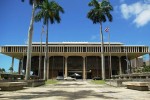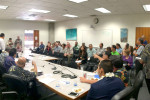Published in The Maui News, Feb. 22, 2015
By MIKE WHITE, for The Maui News
As County Council chair, I’m committed to open government and civic engagement by supporting the community’s ability to obtain relevant information and documentation.
After presiding over the Feb. 6 council meeting when Patrick Wong was confirmed for another term as corporation counsel and reading the Feb. 11 Maui News editorial (“More sunshine please, not less”), it’s obvious more needs to be done.
I’ve requested a public meeting with Cheryl Kakazu Park, who administers the state’s open-government laws as director of the Office of Information Practices, or OIP. The meeting’s purpose will be to remind the public and county officials of the council’s obligations under the Uniform Information Practices Act (relating to public records) and the Sunshine Law (relating to public meetings).
I’m also supporting Council Vice Chair Don Guzman’s efforts, as chair of the Committee of the Whole, to better inform the public of legal matters by placing more court records on the council’s website and working with the corporation counsel to provide more litigation-related information in open session.
In the meantime, please allow me to try to clear up a few things, starting with some factual errors in the editorial.
The editorial falsely implies that the council and its committees go into executive session because of convenience and a preference for secrecy. In fact, it’s always done on the advice of counsel.
In addition, the editorial incorrectly claims the council sued the OIP. The corporation counsel filed the lawsuit – which seeks a ruling that the attorney-client privilege trumps the UIPA – on behalf of the County of Maui.
I welcomed and appreciated all of the public testimony – from more than 50 Maui County residents – on Wong’s appointment. I understand frustration by some that the vote followed a lengthy executive meeting and that issues raised in testimony were not directly addressed in open session.
Council members are sometimes unable to correct statements made in testimony because their knowledge comes from confidential meetings with attorneys in executive meetings. Breaching confidentiality can be a violation of the Code of Ethics and result in penalties including impeachment.
Some testimony alleged that Wong’s representation had subjected the county to financial liability.
To the contrary, the county’s representation by Wong and his staff during the past four years has saved taxpayers millions of dollars by zealous advocacy and astute negotiation.
Some testifiers stated Wong’s actions have already cost the county “$100 million” in a lawsuit contending the county’s use of wastewater injection wells in Lahaina violates the Clean Water Act. That statement is not true.
Along with expert special counsel, Wong is defending the county in Hawaii Wildlife Fund vs. the County of Maui. To date, no penalties have been assessed, and no money has changed hands between the parties.
While the county is threatened with serious penalties in the case, Wong’s legal team is seeking a solution that’s fair to county taxpayers and consistent with the law.
There was also substantial testimony about the 2014 initiative calling for a moratorium on the cultivation of genetically engineered crops, as reported by The Maui News (“Corporation counsel criticized for role in high-profile cases,” Feb. 7). I note the County Charter prohibits the council from amending any voter-approved ordinance for a 12-month period, and litigation on the moratorium is pending in federal court.
Wong has stated his representation in the case is based on his reading of the County Charter, which is appropriate.
The council and its committees occasionally hold executive meetings to consult with county’s attorneys on pending litigation and to discuss sensitive personnel issues.
Executive meetings are closed to the public pursuant to Section 92-5(a) of the Hawaii Revised Statues, which is part of the Sunshine Law.
When an executive session is convened, it’s only because there’s a necessity.
I applaud those who invest the time and effort to be civically engaged, and I welcome scrutiny of the council’s work. Those who watch the council and its committees work can attest that public testimony is always carefully considered and frequently results in revisions to legislation and other responsive action.
The council will continue to work on making more information available for public review, while also protecting the county treasury and upholding ethical standards. I know we all seek a stronger collaboration between the council and the public for Maui County’s greater good.
Mahalo.
* Mike White is the chair of the Maui County Council and holds the council seat for the Paia-Haiku-Makawao residency area.







